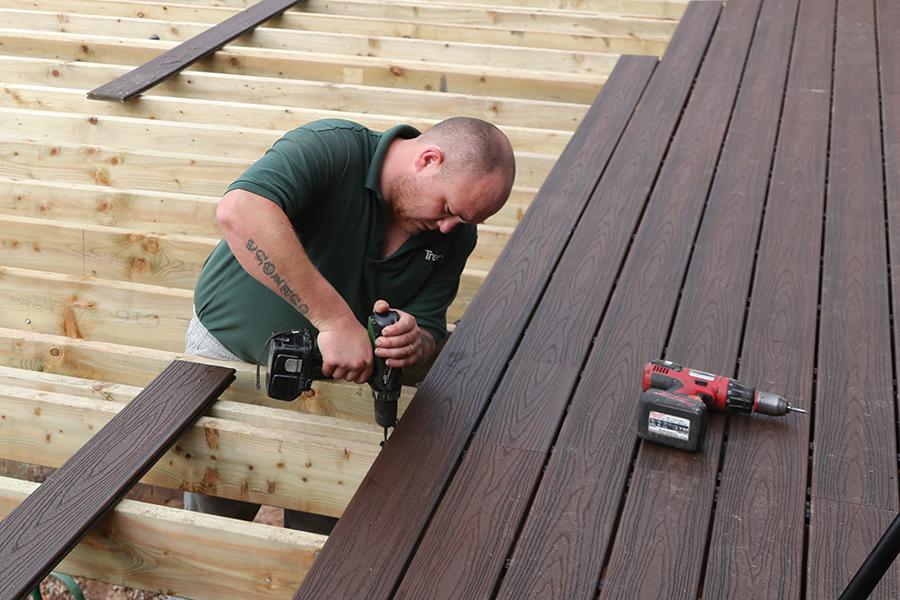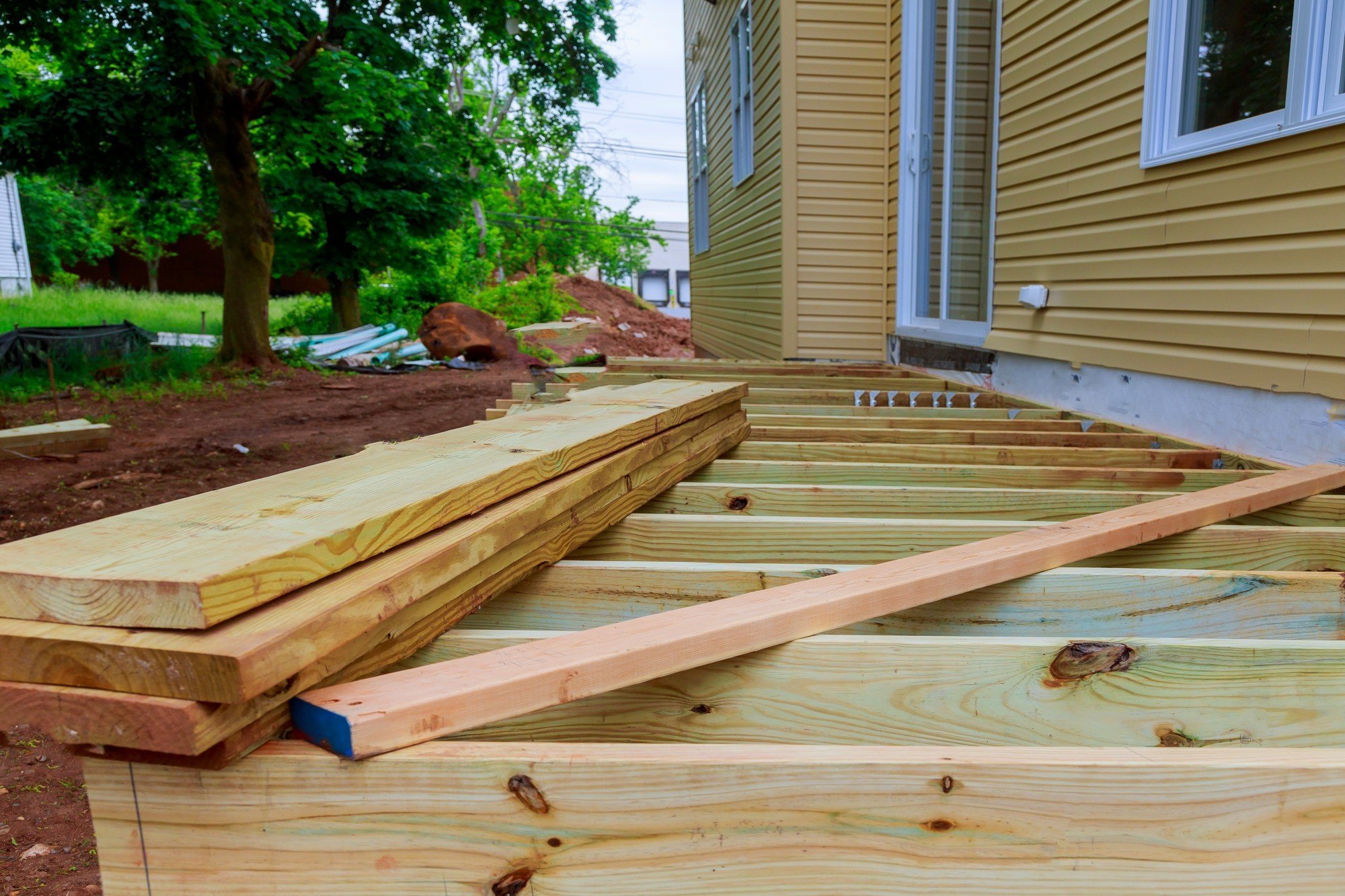Just how to Pick the Right Products for Your Deck Setup Task
Picking the proper materials for your deck installation project can appear overwhelming. The secret is to balance your budget, layout choices, and way of life needs to create a deck that will certainly improve your outdoor space for years to come.
Recognizing the Various Kinds Of Deck Materials
When starting a deck installation task, the option of materials ends up being a pivotal decision. Different alternatives are readily available, each with one-of-a-kind attributes and aesthetic allure. Standard wood, for circumstances, uses a timeless, all-natural appearance and is commonly a lot more cost-effective. Nonetheless, it can warp in time and requires regular maintenance. Composite materials, on the other hand, are a blend of wood and plastic, supplying toughness and resistance to weather elements. They require much less upkeep contrasted to timber however are usually much more pricey. An additional choice is plastic, which is practically maintenance-free and immune to pests and rot, albeit less natural-looking. By recognizing these differences, homeowners can make a more informed choice on one of the most appropriate deck material for their specific demands.
Assessing the Toughness and Upkeep Needs of Deck Products
Assessing the durability and upkeep demands of deck materials is a crucial action in deck setup. Sturdiness entails the product's ability to hold up against extreme weather condition conditions, wear and tear, and its long life.
Comprehending maintenance needs is similarly important. Some products need normal sealing or staining to keep their appearance and resist dampness damage, while others, like composite outdoor decking, demand much less upkeep. By evaluating these aspects, one can choose one of the most appropriate outdoor decking material, ensuring an equilibrium between longevity, maintenance demands, and aesthetic allure.
Cost Evaluation: Comparing Timber and Compound Decking
Although cost might originally appear like a second concern, it is a substantial element when contrasting timber and composite decking. On the other hand, composite decking, while costlier initially, calls for much less upkeep, potentially decreasing long-lasting costs. Potential deck proprietors need to consider their budget plan and desire to preserve their decks when determining between wood and composite outdoor decking.
Appearances and Layout Versatility of Decking Materials
All-natural wood decking supplies a traditional, ageless look, while composite products supply a wide range of colors and structures to match diverse tastes and designs. Composite materials, while much less flexible in layout, are still versatile sufficient for most deck designs. These elements, for that reason, are vital factors in the option of outdoor decking product.
Ecological Effect of Decking Materials
When choosing outdoor decking materials, one must consider not just looks and resilience, but additionally the ecological influence. It's crucial to examine the sustainability of materials and check out recycled decking options. Understanding the potential influence on regional communities will guarantee a much more environmentally responsible selection.
Examining Material Sustainability
In the world of deck building and construction, evaluating material sustainability is a crucial action. This includes reviewing the ecological impact of each prospective product, taking into consideration elements such as the power required for its production, its carbon footprint, and its end-of-life disposal or recycling options. For instance, wood is an eco-friendly resource, but unsustainable logging practices can result in deforestation. Composite decking products often integrate timber and plastic, reducing the demand for new hardwood however increasing reliance on fossil gas. Light weight aluminum and other metals might be more resilient and recyclable, yet their extraction and processing can be energy-intensive. Therefore, the selection of decking materials need to stabilize functionality, aesthetics, cost, and sustainability to make sure a liable and lasting setup.
Recycled Outdoor Decking Options

Composite outdoor decking is specifically preferred due to its sturdiness and convenience of upkeep. It's immune to rot, pests, and fading, making it a here lasting alternative. Recycled plastic outdoor decking, on the other hand, is very resistant and needs very little upkeep. While these products might bring a greater first price, their longevity and decreased ecological influence make them a sensible financial investment for the eco-conscious house owner.

Influence On Local Environments
While the advantages of utilizing recycled products for outdoor decking can not be overemphasized, it's just as essential to think about the more comprehensive environmental effects of these choices. The extraction, processing, and transportation of materials can exceptionally affect neighborhood communities. Logging for hardwood decking adds to environment loss and environment change. Even the manufacturing of composite products can release dangerous emissions. Conversely, utilizing recycled or sustainably sourced products can aid reduce these impacts. In addition, thinking about the life expectancy of products can lower ecological impact; longer-lasting options require less frequent substitute, therefore conserving resources. Proper disposal of old decking is important to reducing landfill waste. Basically, an eco-conscious deck project needs mindful material choice, lasting sourcing, and accountable disposal.
Making Your Decision: Tips for Choosing the most effective Deck Products
As the write-up transitions right into the subtopic of "Making Your Decision: Tips for Picking the most effective Deck Products", it is crucial to understand the selection of deck products available. Striking an equilibrium between sturdiness and visual appeal is vital in this selection process. The complying with discussion will assist visitors in making an informed selection based on these vital considerations.
Recognizing Different Deck Products
The job of choosing the right materials for your deck setup can appear discouraging due to the substantial selection of alternatives readily available. Plastic or PVC decks are also much more resilient and need less upkeep than composite products, yet they can look much less natural. Light weight aluminum decks are solid, light-weight, and resistant to rot, but they are also the most pricey alternative.
Durability vs. Aesthetics Equilibrium
Stabilizing toughness with looks can be a difficulty when selecting deck products. The choice often boils down to individual preferences and the deck's intended usage. High-traffic areas may demand long lasting materials like composite decking, which holds up against deterioration but might lack the natural beauty of timber. On the other hand, timber uses a timeless allure and warmth that artificial products battle to duplicate. However, it calls for much more upkeep and might not last as long. As a result, property owners need to strike a balance, taking into consideration both the deck's functional demands and their visual choices. By doing so, they can guarantee their deck continues to be a functional and appealing exterior area for years to find.
Conclusion
In final thought, picking the ideal products for your deck home setup job requires careful factor to consider of elements such as sturdiness, maintenance, cost, visual appeals, and environmental influence. Whether you choose for conventional wood or composite materials, your selection must line up with your budget, layout choices, and way of life. Ultimately, the most effective decking material is one that boosts your outside space and gives informative post pleasure for many years ahead.
Comments on “There are plenty of inspiring design ideas to consider during your deck installation process.”